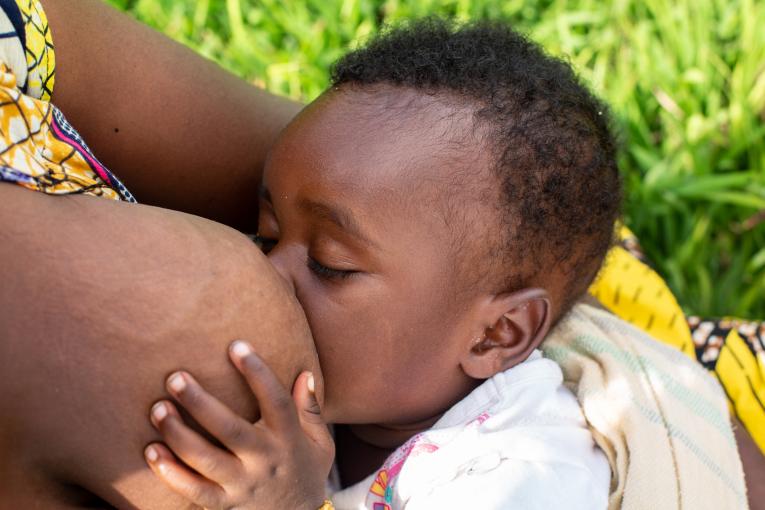Breastfeeding exclusively for 6 months prevents malnutrition

Written by Deus NTAKIRUTIMANA
The number of children at risk of malnutrition in Karongi district has drastically reduced owing to mothers’ adoption of exclusive breastfeeding of their babies from birth up to six months.
Countries around the globe observed the ‘World Breastfeeding Week’ -an annual celebration which is held every year from 1 to 7 August in more than 120 countries.
This year’s theme is ‘ Supporting Breastfeeding and Complementary Feeding Practices for Quality Early Childhood Development’.
For Rwanda, on Thursday August 6th, part of the celebrations was held in Karongi District at the Birambo health center where parents fed their babies with balanced diet.
The event was organized by by Hinga Weze in collaboration with the National Early Childhood Development Program (NECDP) with other partners in development.
The events aimed at raising awareness of infant feeding with a particular focus on breastfeeding from 0-24 months, mobilising community on breaking down social norms that hinder complementary feeding and to initiate joint collaboration on the prevention and reduction of malnutrition in Rwanda.
Niyomufasha Emmerence, 24, of Birambo Cell, under Ubudehe category I says that following the advice of community workers makes her child less malnourished.
“My son is constantly being tested for the signs thanks to the knowledge provided by community health workers in Rwanda in collaboration with the Hinga Weze project.”
Niyomushasha says they were taught how to breastfeed; “A mother breastfeeds a baby at birth, which helps wake her brain. I was told that I should breastfeed for six months without interfering. I did and now she is healthy. ”
Appolinarie Yamfashije Community health worker in charge of child and maternal health in the village of Kabasare at Birambo cell says that no child has a nutritional problem.
“We have been monitoring mothers and have not had a malnourished child since 2017. Some of the skills that we learned from the health centre and Hinga Weze have helped us take better care of these parents,” she explains.
Yamfashije says, “We teach them to breastfeed properly, preparing a balanced diet, avoiding contamination. For the past three years we have no baby looking yellow [with a nutritional problem].”
Some of the foods considered for proper dieting of children and mothers include; i) grains, roots and tubers; ii) Legumes and nuts; iii) Dairy products (milk, yogurt, cheese); iv) meat based foods (meat, fish, poultry and liver / organ meats); v) eggs; vi) Fruits and vegetables rich in vitamin A and vii) Other fruits and vegetables.
According to Munezero Jean Baptiste, the district’s officer in charge of Early Childhood Development, the government’s partnership with development partners, including Hinga Weze, has produced tangible results for the region’s children, who are now in good health, so that they can grow up without a future.
Nearly 87% of Rwandan mothers breastfeed their babies during the first six months of their lives without any assistance.
According to Gakwerere Isaie, a representative of the project in Karongi district, parents should breastfeed their babies at least until their health is improved. “Hinga Weze admires the new mindset, the number of children in red or yellow is significantly decreased, because of breastfeeding properly like a good foundation we thought.”
The Feed the Future Rwanda, Hinga Weze Activity is a five-year USAID-funded project (2017-2022) that aims to sustainably increase smallholder farmers’ income, improve the nutritional status of women and children, and increase the resilience of Rwanda’s agricultural and food systems to a changing climate.
By 2022, the project will have benefited over 700,000 smallholder farmers in ten target districts: Bugesera, Gatsibo, Kayonza, and Ngoma (Eastern Province); Karongi, Ngororero, Nyabihu, Nyamasheke, and Rutsiro (Western Province); and Nyamagabe (Southern Province) and across five value chains: high-iron beans, orange flesh sweet potato (OFSP), Irish potato, maize, and horticulture.



